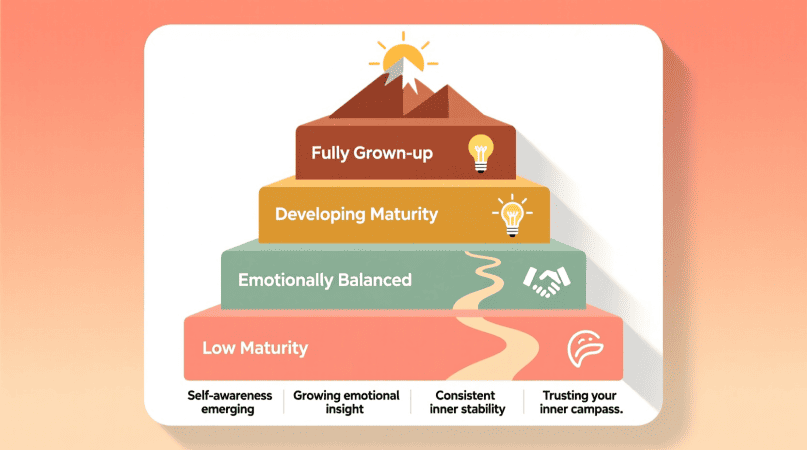
We all know our biological age, but how mature are we really when it comes to decision-making, handling emotions, and building relationships? That’s where a psychological maturity test comes in. It helps you see whether your mindset is impulsive and carefree or balanced and responsible.
What Is Psychological Maturity?
Psychological maturity is more than just “acting like an adult.” It reflects:
- Emotional regulation – staying calm under pressure.
- Social responsibility – respecting others and following through on commitments.
- Self-awareness – recognizing mistakes and learning from them.
- Balanced decision-making – weighing long-term consequences over quick rewards.
Try our mental age test free to compare your psychological maturity with your mental age.
How Is Psychological Maturity Measured?
Psychologists use different methods to assess maturity. Some are academic, while others are quick quizzes you can take online.
Scientific Tools
- Ego Development Scales (WUSCT): Measures stages of personal growth.
- Vineland Social Maturity Scale: Evaluates social competence and daily living skills.
- Emotional Intelligence Tests (MSCEIT): Show how well you understand and manage emotions.
- Impulse Control Assessments: Look at decision-making under stress.
Popular Online Quizzes
- Lifestyle-based tests that ask about habits, reactions, and problem-solving.
- Provide quick results with basic interpretation.
- Not as precise as professional assessments, but still useful for self-reflection.
Learn how it compares to your real years in mental age vs chronological age.
Signs of High vs. Low Psychological Maturity
| High Maturity | Low Maturity |
|---|---|
| Takes responsibility for actions | Blames others easily |
| Controls emotions without shutting down | Reacts impulsively |
| Listens and respects different views | Dismisses or interrupts |
| Makes thoughtful decisions | Chases short-term gratification |
Seeing yourself in both columns is normal. The point of testing is not judgment, but awareness.
Why Take a Psychological Maturity Test?
- Better relationships: Mature communication prevents unnecessary conflict.
- Career growth: Employers value responsibility and self-regulation.
- Personal development: Knowing your weak spots gives you direction for growth.
- Healthier mindset: Maturity helps you manage stress and setbacks without falling apart.
Explore can maturity be measured with a test? to understand the science behind these assessments
Interpreting Your Results
- Low maturity score: Focus on building patience and self-control.
- Average score: You balance emotions and logic but may struggle under pressure.
- High score: You show resilience, responsibility, and self-awareness.
Remember: maturity is not fixed. It can grow through experiences, reflection, and conscious effort.
Explore the connection between intelligence and maturity in is mental age the same as IQ.
FAQs
Is psychological maturity the same as emotional intelligence?
They overlap, but maturity also includes responsibility and long-term thinking.
Can maturity change over time?
Yes. With age, experiences, and intentional growth, maturity develops.
Are online tests accurate?
They’re helpful for self-reflection, but professional tools are more reliable.
Why does maturity matter?
It shapes how you communicate, manage stress, and make decisions in life.
- You can work on specific habits to boost your emotional intelligence and handle stress better.
- Skeptics often wonder if maturity can be quantified through a standard questionnaire.
- Research varies on when men fully mature compared to women.
- It is helpful to distinguish between a mental age vs maturity assessment before starting.
- Your psychological growth largely determines how personality traits develop over time.
- Understanding the gap between mental and chronological years is key to self-awareness.
- Some individuals discover their psychological age is higher than their actual birth age.